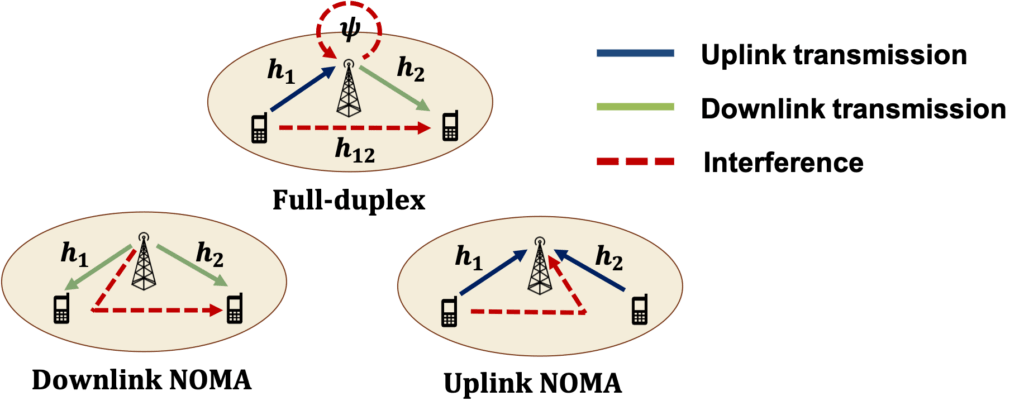Multi-user communication techniques have emerged as one of the key enabling technologies for 5G wireless networks. Non-orthogonal multiple-access (NOMA) is one of these techniques in which multiple users can be scheduled simultaneously either in uplink or in downlink and successive interference cancellation is employed to mitigate the effect of interference. Full-duplex (FD) communication is another technique in which two half-duplex users, one in uplink and one in downlink, can be activated simultaneously by a full-duplex base station. Several digital and analog interference cancellation techniques have been proposed to mitigate the self-interference at the base station in such networks.

As the interference caused by multi-user activity depends on the set of active users in these networks, an intelligent multi-user scheduling scheme is required to achieve promising multiplexing gains. The objective of the scheduler is to maximize the system utility (e.g. system throughput) subject to the users’ individual demand constraints, e.g. minimum utility demands or temporal share demands. Schedulers which satisfy minimum utility demand constraints ensure that each individual user is allocated a fraction of the system throughput which is in agreement with their corresponding quality of service demands. Temporal share demand constraints are considered in order to control the average latency in delay sensitive applications and to manage power consumption in the users’ devices.

In this project, we consider multi-user scheduling under temporal, and utilitarian fairness constraints. We have shown that under practical scenarios, multi-user scheduling techniques lead to significant improvements compared to single user scheduling techniques in terms of the system throughput. The objective of this research project is to (i) provide a general framework for multi-user scheduling which is applicable under arbitrary utility function and various user quality of service constraints, (ii) uncover the fundamental limits of multi-user scheduling such as maximum achievable throughput through analytical characterization of the throughput function, and (iii) provide practical low-complexity algorithms for near-optimal scheduling and verify their effectiveness under practical static and mobile scenarios using numerical simulations of cellular networks.
- S. Shahsavari, F. Shirani Chaharsooghi, E. Erkip, “On the fundamental limits of multi-user scheduling under short-term fairness constraints,” To appear in IEEE International Symposium on Information Theory, July 2019.
-
S. Shahsavari, F. Shirani, E. Erkip, “A General Framework for Temporal Fair User Scheduling in NOMA Systems“, IEEE Journal of Selected Topics in Signal Processing, February 2019.
- S. Shahsavari, F. Shirani Chaharsooghi, E. Erkip, “Opportunistic temporal fair scheduling for non-orthogonal multiple access,” 56th Annual Allerton Conference on Communication, Control, and Computing, 2018.
- S. Shahsavari, D. Ramirez, and E. Erkip, “Joint user scheduling and power optimization in full-duplex cells with successive interference cancellation,” IEEE Asilomar Conference on Signals, Systems, and Computers, 2017.